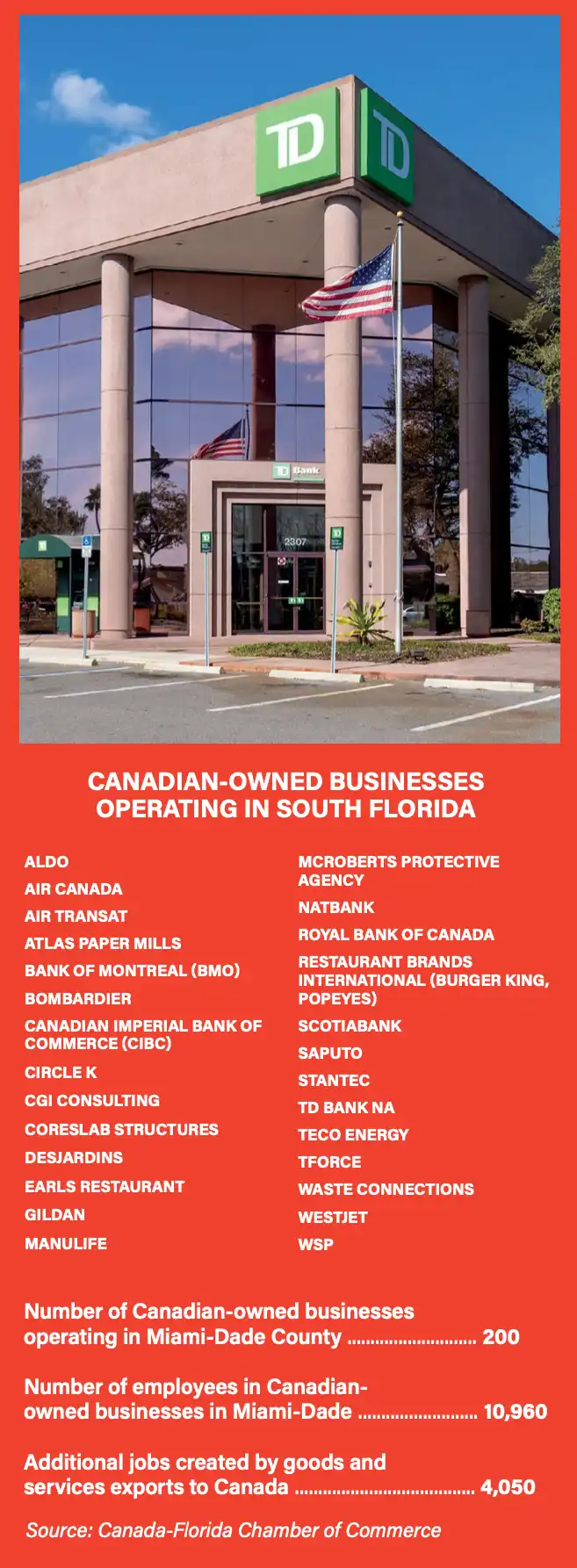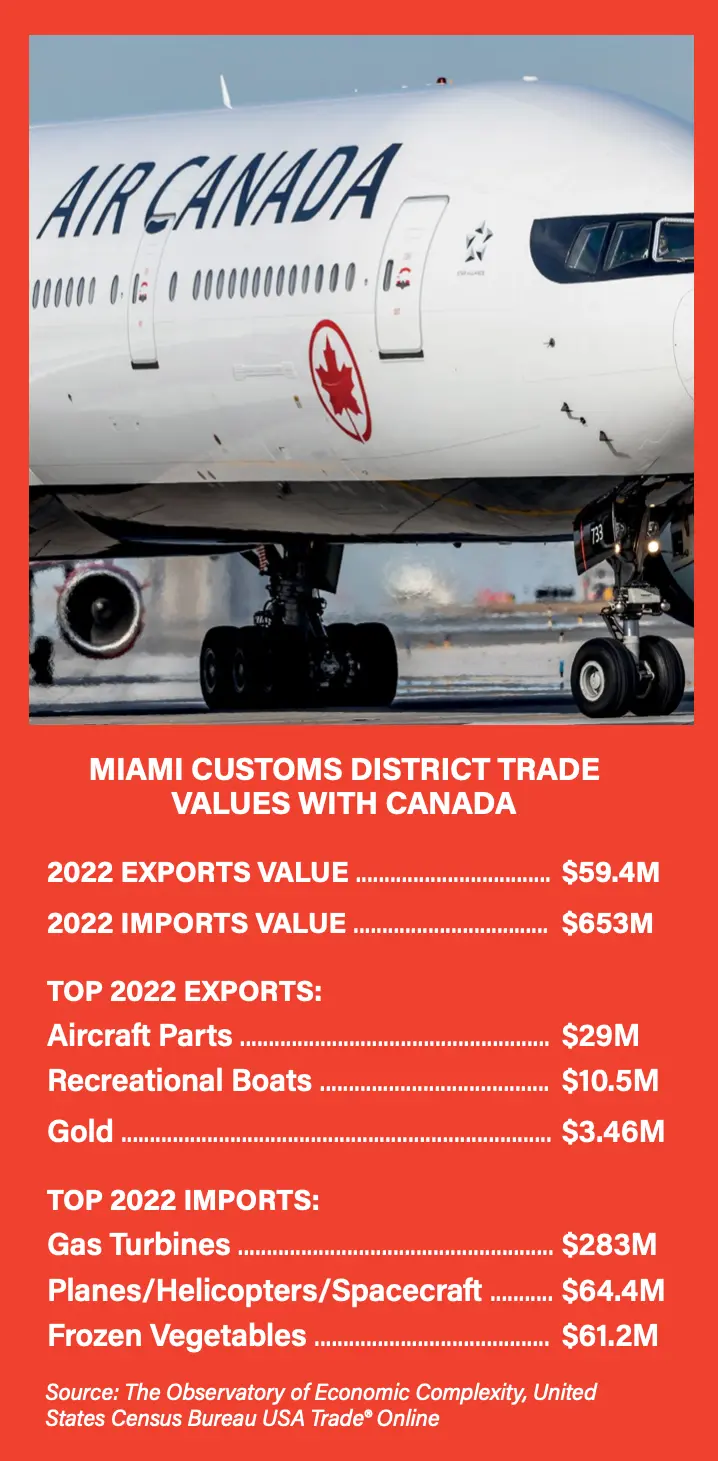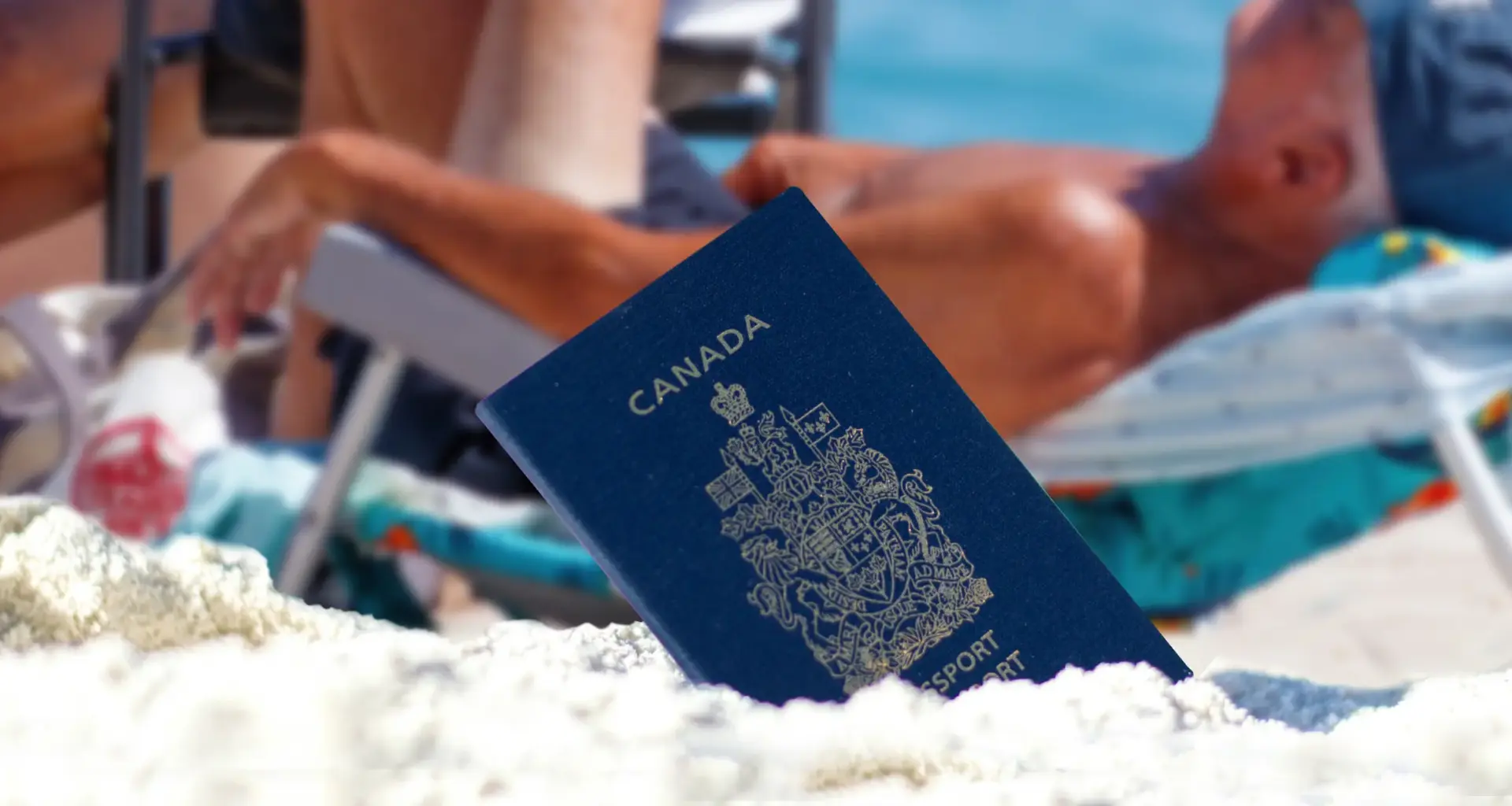Long a stomping ground for Canadian visitors in the winter, South Florida is also a growing business platform for Canadian companies
By Yousra Benkirane
“Juncos” head to the Sunshine State every year to escape the winter. It’s not uncommon in South Florida to see your Canadian neighbors six months out of the year.
A recent report showed that Florida welcomes almost 3.5 million Canadians annually, while an estimated 150,000 Canadians reside year-round in South Florida. In the past few years, however, there has been more to the relationship between Florida and our neighbors to the north than just sun-seekers. Canada has maintained a strong economic relationship with the state, becoming its biggest international economic partner, including in Florida-origin exports, imports, visitors, and foreign direct investment.

“[Canadians] don’t only come here to spend a couple of weeks. Many come to live here for at least six months. That is important in terms of what they bring to the local economy,” explains the newly appointed Consul General of Canada in Miami, Sylvia Cesaratto. “We’re the biggest foreign investors when it comes to private real estate in Florida,” she adds, citing over $600 million in local property taxes that Canadians contribute annually.

Not all these new residents are retirees sipping margaritas on the beach. “You see interest from Canadian corporations and entrepreneurs [who want] to come down here,” says Louis Guay, a tax principal at Kaufman Rossin and Chairman of the Board for the Canada-Florida Chamber of Commerce (CFCC). According to a report by research firm Joorney, 2021 saw an influx of Canadians who moved to Florida to start a business with the E-2 visa, which is a non-immigrant visa given to individuals from treaty countries who have invested or are in the process of investing a substantial amount of capital in a U.S. business. Many Canadian entrepreneurs use this to start or expand their businesses in Miami. “There’s this connection between Canada and South Florida that’s been around for a very long time, starting with the Canadian snowbirds,” says Guay.
Indeed, Canada is one of Florida’s most important trade partners. Last year, Canada and Florida had a trading relationship of

$8 billion, making it the No. 2 export destination and No. 3 import origin for Florida. Enterprise Florida’s Canada office director, Hesam Houryaband, jokes that “Canadians know Florida more than they know other provinces in Canada.” Citing their affinity for the climate, and the similarities in time zone and language, “it only makes sense for them to expand into Florida,” he says.
Moreover, Miami’s reputation as the Gateway for the Americas is important to Canadian companies. “One thing that stands out is South Florida’s regional location, not just for the Southeast U.S., but also the Caribbean and the Latin American markets,” Houryaband says. “When a Canadian company wants to expand to those territories and markets, the most natural place [to] do it from is Miami.” It’s also often cost-effective to have Canadian products depot at a free trade zone in South Florida before shipping them to Latin America or the Caribbean. “With the deep-water ports and international access routes, [Greater Miami] becomes a sort of launching pad for them.”
Along with the seaports, Miami International Airport (MIA) is another key for Canadian cargo operations. The airport is the United States’ primary cargo gateway to Latin America, which Canada’s largest airline, Air Canada, uses to full advantage. Besides flying with a combination passenger-and-freighter fleet, the airline intends to invest in more all-cargo aircraft in the future, including the first converted 767 cargo jets, which began operating on routes linking Miami to Toronto in October 2021. This made Miami the airline’s first scheduled freighter destination in the continental U.S.
“We are seeing a very strong demand complemented with cargo, [so] we are adding dedicated freighter aircraft into the fleet,” says Vincent Gauthier-Doré, senior director of sales at Air Canada. “Miami is a key hub for us to import and export goods between the two countries and further into Latin America.” In April of last year, the airline ordered two factory-built B767-300Fs that are expected to begin operating this year. This is in addition to the newly built B777Fs that are expected to begin service in 2024, expanding Air Canada’s cargo freighters from three to twelve between now and the end of 2024.
To spur greater connectivity and trade, Air Canada has also reintroduced its direct flights from Vancouver to Miami after an 18-year hiatus, joining daily flights from Montreal and Toronto. “It really responds to a need to have a northeast/southeast link that’s efficient,” explains Gauthier-Doré. “That’s why this route will not only be seasonal, but a year-round service.” Traditionally, airlines fly narrow-body aircraft in North America, but since the demand for Canada-Florida flights is so strong, the airline is using wide-body aircraft.
A SURGE OF CANADIAN COMPANIES

According to the Canada-Florida Chamber, around 200 Canadian-owned businesses are now operating in Miami-Dade County – including international consulting firms Stantec and CGI – employing 10,960 people. Additionally, 4,050 county jobs depend on goods and services exports to Canada.
The presence of Canadian visitors and residents in South Florida has only encouraged additional assimilation between the two cultures. Even the famous Canadian coffee chain, Tim Hortons, is looking to bring a piece of home to the French-Canadian communities in South Florida. Founded in 1964 in Ontario, Canada, Tim Hortons is Canada’s largest fast-food restaurant chain, with 5,352 restaurants in 15 countries, including 626 locations in New York, Michigan, and Ohio. And now, talks of Miami-Dade and Broward County joining the list are underway. In a press release, the head of business development for Tim Hortons in the U.S., Ryan Ferranti, said, “We are excited for our recent expansion into new markets in the U.S. and are prioritizing growth in the South Florida market.” Although there is no projected date set for the expansion, the company has claimed to have identified favorable trade areas within the market. “While we are targeting growth in multiple territories within the state of Florida, Miami-Dade and Broward counties are of particular interest given the significant Canadian presence and tourism in South Florida.”
A year and a half ago, the Bank of Montreal (BMO) developed a South Florida team as part of an expanded focus to target middle market companies (commercial businesses that earn between $20 million and $1 billion in annual revenue). The reason was simple. “It’s a great market and there’s a compelling cross-border component here [in South Florida],” explains Marty McAndrew, managing director and Florida market executive at BMO. The Canadian-based bank currently has 17 traditional branches in Southwest Florida ranging from Tampa to Naples. The South Florida team, however, centers around commercial banking that does not require branches. Made up of Miami natives, the team provides solutions to clients such as providing capital, helping manage foreign exchanges, providing complex and strategic guidance, and facilitating introductions to relevant Canadian business partners. “The principal in our Miami market was born and raised in Miami. Local connectivity is kind of our secret sauce,” McAndrew explains.
Canadian-based TD Bank Group is another institution with a strong presence in South Florida, totaling 63 branches in Miami-Dade County. In April of last year, the bank announced the launch of a new technology hub in Fort Lauderdale to help TD tap into the region’s surging tech community. The new center will allow TD to scour tech and innovation talent and deliver new digital products and services to its customers. The company plans to add 200 new jobs in the area over the next two years; the influx of talent is expected to accelerate investments in new technologies and enhance digital experiences for its customers.
Then there’s Bombardier, the Canadian business aircraft manufacturer. Headquartered in Montréal, Bombardier opened its new Miami-Opa Locka Service Centre at the Miami-Opa Locka Executive Airport (OPF) late last year. The 300,000-square-foot facility will be capable of providing quick and efficient maintenance, repair, and overhaul capabilities for all Bombardier business aircraft. When fully operational, the $100 million project will create almost 300 aerospace jobs in the community, including more than 225 for highly experienced technicians.

“The U.S. is an important market for Bombardier with close to 3,000 aircraft in our fleet, and this highly-efficient facility provides a key focal point for customers based in the area, and those who will visit from as far as Latin America,” said Éric Martel, President and CEO of Bombardier, when the center was opened. “I am delighted to highlight this inauguration that significantly grows our footprint and employment base in Florida.”
The State of Florida is also working closely with Canadian firms to sustain growth for both regions. In February, Enterprise Florida – the state’s commerce department – and the Canada-Florida Chamber of Commerce invited a Canadian delegation to Fort Lauderdale. Led by CFCC President Eric P. Tremblay, the trade mission’s group included executives from 13 Canadian companies in industries ranging from tech to construction.
Among the participants was Alfred Technologies, a wine and spirits information technology firm (see story on page 44). Using artificial intelligence, Alfred Technologies offers inventory solutions, digital wine lists, and menus for restaurant clients. Headquartered in Québec with an office in San Francisco, Alfred Technologies seeks to make its presence known in Florida, which has over 40,000 restaurants and a vibrant hospitality industry – especially in the Miami area, where it intends to open an office. “The energy that we will put into our development is invested in the Florida region,” says Élise Doucet, head of sales. “The industry here is very healthy and growing.”
Indeed, the future seems promising for Miami and Canada’s economic relationship. The first mission from South Florida to Canada has already been planned for September 2023 and the Québec government is now looking to open an office in the Brickell financial district, emphasizing a commitment to strengthen the country’s economic and institutional ties with South Florida. The office – which will be headed by the current director of the Québec office in Barcelona, Isabelle Dessureault – will support the exports of Québec companies and help identify business and partnership opportunities for Québec-based businesses. “Our most recent trade mission showed that the interest of Canadian businesses towards South Florida and Miami-Dade County is strong and not slowing down,” says Guay. “We will continue to build on those solid foundations.”













